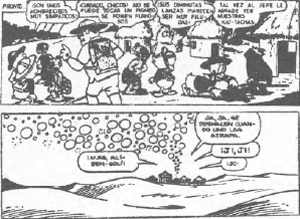7. MORAL QUALITIES. They are like children. Friendly, carefree, naive, trustful and happy. They throw temper tantrums when they are upset. But it is ever so easy to placate them and even, how shall we say, deceive them. The prudent tourist will bring a few trinkets which he can readily exchange for quantities of native jewelry. The savages are extraordinarily receptive; they accept any kind of gift, whether it be some artifact of civilization, or money, and they will even, in the last resort, accept the return of their own treasures, as long as it is in the form of a gift. They are disinterested and very generous. Clergy who are tired of dealing with spoiled juvenile delinquents, can relax with some good old-fashioned missionary work among primitives untouched by Christianity. Yet they are willing to give up everything material.
EVERYTHING. EVERYTHING. So they are an inexhaustible font of riches and treasures which they cannot use. They are superstitious and imaginative. Without pretensions to erudition, we may describe them as the typical noble savage referred to by Christopher Columbus, Jean-Jacques Rousseau, Marco Polo, Richard Nixon, William Shakespeare and Queen Victoria.

8. AMUSEMENTS. The primitives sing, dance, and sometimes for a change, have revolutions. They tend to use any mechanical object you might bring with you (telephone, watch, guns) as a toy.
9. LANGUAGE. No need for an interpreter or phrase book. Almost all of them speak fluent Duckburgish. And if you have a small child with you, don't worry, he will get on fine with those other little natives whose language tends to the babyish kind, with a preference for gutturals.
10. ECONOMIC BASE. Subsistence economy. Sheep, fish, and fruit. Sometimes, they sell things. When the occasion arises they manufacture objects for the tourist trade; don't buy them, for you can get them, and more, for free, by tricking them. They show an extraordinary attachment to the earth, which renders them even more natural. Abundance reigns. They do not need to produce. They are model consumers. Perhaps their happiness is due to the fact that they don't work.
11. POLITICAL STRUCTURE. The tourist will find this very much to his taste. In the paleolithic, barbaric group of peoples, there is a natural democracy. All are equal, except the king who is more equal than the others. This renders civil liberties nugatory; executive, legislative and judical powers are fused into one. Nor is there any necessity for voting or newspapers. Everything is shared, as in a Disneyland club, if we may be permitted the comparison; and the king does not have any real authority or rights, beyond his title, any more than a general in a Disneyland club, if we may be permitted another comparison. It is this democracy which distinguishes the paleolithic group from the second group, with its ancient, degenerate cultures, where the king holds unlimited power, but also lives under the constant fear of overthrow. Fortunately, however, his native subjects suffer from a rather curious weakness:.always wanting to reinstitute the monarchy.
12. RELIGION. None, because they live in a Paradise Lost, or a true Garden of Eden before the Fall.
13. NATIONAL EMBLEM. The mollusk, of the invertebrate family.
14. NATIONAL COLOR. Immaculate white.
15. NATIONAL ANIMAL. The sheep, as long as it is not lost or black..
16. MAGICAL PROPERTIES. Those who have not had the great good fortune to have been there, may find this perhaps the most important and most difficult aspect of all, but it represents the very essence of the noble savage and the reason why he has been left by preference in a relatively backward state, free from the conflicts besetting contemporary society. Being in close communion with the natural environment, the savage is able to radiate natural goodness, and absolute ethical purity. Unknown to himself, he constitutes a source of permanent or constantly renewable sanctity. Just as there exist reserves of Indians and of wilderness, why should there not be reserves of morality and innocence? Somehow, this morality and innocence will succeed, without changing the technologized societies, in saving humanity. They are redemption itself.
17. FUNERAL RITES. They never die.